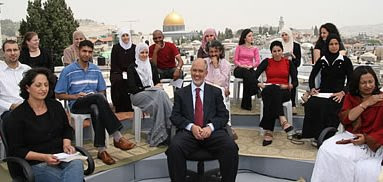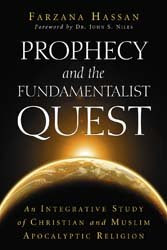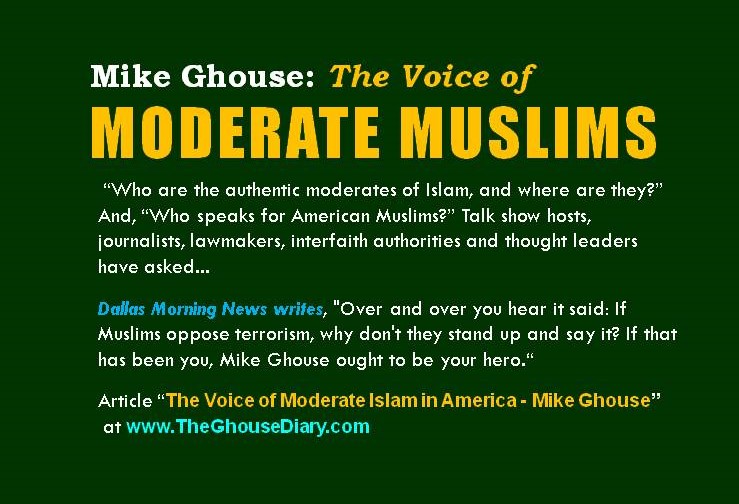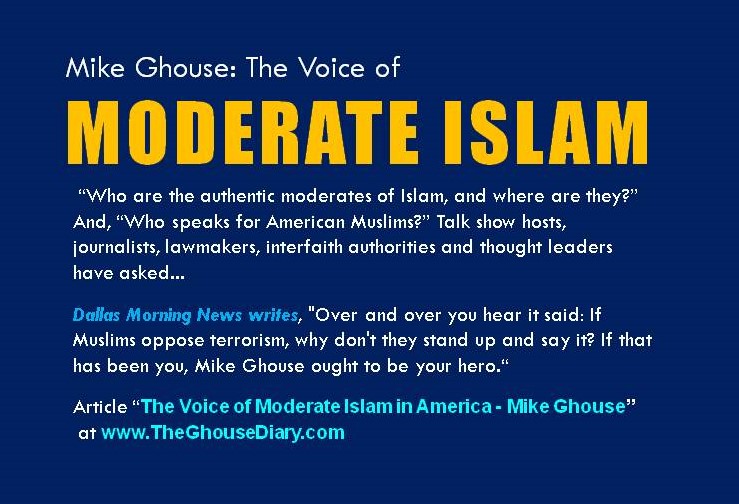Insecure men seek refuge in mis-interpreting Hadith or even Qur’aan to have their way in family or community matters. Most times, it is really not about religion, it is about their insecurities.
They have to feel superior by pushing the women behind; it has worked in older societies, and women also have fed the ego of the insecure men that they are right… or have backed off due to the pressures from the men.
From the pulpit to the preachers, many often proclaim Islam's liberation of women 1400 years ago. After all Islam did recognize that women possessed souls -this acknowledged only over the past 100 years in Christianity and Islam did give women the right to vote -yet another relatively recent phenomena in Western society. We are quick to convince skeptics of Islam's superiority in that the first martyr in Islam was a woman, the first to accept Islam was Khadijah, the first nurse was Rufaida, that the one from whom we have learned one third of our faith was Aisha. (May Allah be pleased with them all.)
And why should we not feel proud of such a legacy when this legacy has produced scholarship and numerous examples of leadership, virtue and excellence. Women who, for all intents and purposes, outshone many of their male counterparts despite their "gender."
Virtue today as imposed (or should I say "encouraged") upon Muslim women dictates that a woman should be fully covered (the more the better), that she stays at home and raises the children and fulfill her husband's every wish and desire. It is better that she stays inside than walk outside lest she be a temptress and cause someone to commit sin by looking at her, that she should be silent because her voice is her cover. Should she have questions, it is best that she write them and "fly them" over the barriers so that someone would by chance pick it up and read it and perhaps give her an answer.
We the men, the "proper leaders" know that women come from the rib of man and that it is bent and cannot be made straight, that women are highly emotional and of course have that "menstrual thing", which incapacitates their ability to make proper decisions and to function in a "normal way". There is no way that they can contribute to Islamic work because their voices and "grace" make them weaknesses for men and so it is in keeping with piety that we shut them out and lock them away. After all, men being the rational thinkers are capable of making decisions for women who are in constant need of our superior knowledge.
Hence we do not need them on the boards of our institutions; we fail to put them in leadership positions because it is not compatible with their "feminine nature". As one imam once said, they may start to "fraternize with the men". In keeping with this, we do not really need to give them a big space at the mosque because they should pray at home. Should we be so generous as to offer them some space, we must ensure that it is fully sealed so that there is not enough ventilation and that they are trapped within the confines of limited space with 20 crying babies. It is ok if they don't hear anything because they don't really need that much knowledge, even though the lap of the mother is the first school of the ummah. As long as we don't hear or see them, then all is well.
We should not shame them by giving them the ability to communicate their ideas, thoughts or wishes because we already know them. So we are locking them up for their own good. Anyone who dares to question this must be outside of the proper understanding of Islam. There seems to be some discrepancy between what is said on the pulpit about the excellence of the earlier women and how it translates to reality for our sisters. It has further allowed the perpetuation of blatant double standards in terms of what women and men can and cannot do. Usually men can engage in numerous activities, which if done by women, would cause their commitment to Islam to be questioned.
Women comprise about half of our community, yet they must still compete to have their voices heard, to have space, to be able to go to functions that take into consideration that they need to bring their children. More often than not, when there are issues involving our sisters, they are "dealt with" by the men. When any sisters dare to challenge this, they automatically are branded as western-styled feminists who are trying to sully the sanctity of Islamic values and ideals.
Yet if one were to look on campuses and in general community work the faith based work of this community is being carried on the shoulders of Muslim women. Many whom would ordinarily be silenced are finding their niches and are doing their bit to fulfill their covenant in enjoining right and forbidding evil and in spreading this deen. In fact, women in our community are the flag-bearers of Islam, particularly those who wear hijab because they are easily identifiable. When walking down the street, it is those whom we notice as being Muslim and those who are approached and asked about Islam.
We tend to answer in utopian terms, when asked about our glorious past and ignore the wrongdoing that has been taking place today. It behooves us (men) to believe that we can be wrong or may have wrong understandings of the seerah (biography of Prophet Muhammad) and the place of women in society.
It would appear though that having shut women out of the community has allowed them now to approach Islam and Islamic work with less baggage than men. Men have inherited much cultural baggage that they still keep with them today, cultural practices that have become engrained in our daily practices as being Islamic. As Muslim women return to the authentic understanding of the Qur'an and Seerah, they are in a better position to take on this work and fulfill its requirements.
Islamic work in North America and the world will never be successful until women are completely integrated within the framework of leadership, decision-making and shura. While no one is arguing for "free intermingling" or a neglect of duties of motherhood or the negation of fiqh (and its proper application) there is a need for discussion and critical deconstruction of some of the cultural practices that have become mainstays in our community.
The argument that the time of the prophet was different and now is a time of fitna holds no weight, especially when one considers that the earliest generation of Muslims was in one of the most corrupt societies that existed. Yet women played a vibrant part of its growth and development. They were consulted when decisions were to be made, they were included in matters affecting society's growth and development, some were teachers and others were poets, others fought in war, all this, while still following Allah's commands and the examples of his prophet. There are no shortages of examples of this in the seerah, though they tend to be ignored.
We are quick to point to the fact that we are leaders and have the "last say". Perhaps there is a need to analyze our understanding of leadership. Is a leader one who ignores the needs of others, makes all the decisions and is scared of debate and consultation? The prophet peace be upon him was the opposite of this. He was the best of leaders as he consulted with others and led by example. He was most kind and in fact said that "the one who is best, is the one who is best to his family and I am the best to my family". It may be that we are afraid that women will perform some of the duties we have been doing better than we have, that their knowledge may be more sound and that they may be more fit for leadership positions than those who have traditionally held the reigns. Even in this regard, we seem to forget the just leadership of the Queen of Sheba or a tradition that is rich with female scholarship. If we are sincere in wanting to do what Allah requires of us, we need to be open to this dialogue, admit our injustices to our sisters, ask for forgiveness and try to move forward. A bird can only fly if it flaps both wings.
Allah has made women our equal counterparts and they bring value and insight inherent with their nature that we may not think about or know of. Some scholars explain that women are the spiritual anchors of society. If we are sincere, we need to realize that in many ways we are oppressing our sisters and when we shut women out of leadership roles, banish them to domestic spaces, pretend that we can speak on their behalf, we are oppressing the very ones under whose feet lies paradise. The issues of leadership and involvement are not black and white and those sisters and brothers advocating for change are not asking for all values and standards to be dropped or changed. Instead we are asking for justice and fairness.
Sisters should be a part of the majlis-shura in the masajid and various institutions because leadership (and I am not speaking about being imam here) should be defined based on qualification and not gender. Shura entails that we take the voices of the varying members of our community into consideration. We need to ensure that sisters are able to have equal access to speakers and knowledge so that they are able to grow and learn themselves. Our primary consideration should not be how big a barrier is and whether or not it touches the ceiling. Most importantly we have to let sisters represent themselves, we should not speak for them but with them. The realization should be based upon the trust that women are our partners in establishing Islam in the world and do not have ulterior motives of "fraternizing with the opposite sex." They too want to work with us to benefit Islam, Muslims and society in general.
Muslims have a standard that has to be adhered to as defined by the Qur'an and the practice of the prophet pbuh. We need to rise to the challenge of implementing this within our daily lives, to adhere to its boundaries and to challenge our own bias and (mis)-interpretations of it's application. As men, it is time that we acknowledge the struggles of our sisters (both within and without our community) and it is even more important to recognize the privilege that we have enjoyed due to no real merit but simply because of our gender. If we want to please Allah and to be true to our covenant of bringing this deen to the people around us, it is necessary for us to address these issues. Until such time we will be held accountable before Allah when people reject our self-styled versions of Islam.
Jeewan Chanicka is a contributing writer for Young Muslims Canada website.









